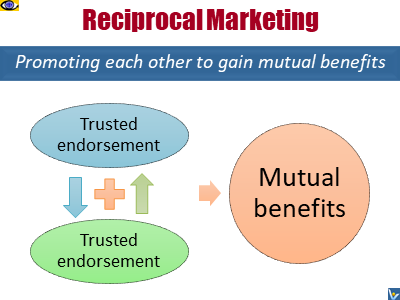|
| |
|
Reciprocal marketing describes a
situation in which two businesses promote each other in order to gain a
mutual benefit.
The most famous example:
Mutual 'Liking' in
social networks. |
|
|
| |
Reciprocal marketing offers a number of potential benefits,
especially for individuals and small businesses. It accelerates the
process of earning trust of prospects in a new market niche,
reduces the cost of attracting new
customers, and is inexpensive to
implement compared with many traditional marketing schemes.
|
|
 |
|
|
|
In business world, reciprocal
marketing is more commonly known as co-op marketing,
cross-promotion, or collaborative marketing. It is common in travel,
tourism, shopping, and other industries.
Example:
Alliances of airlines is an
example of reciprocal marketing.
|
|
| |
In the online business world, link
exchange,
also known as reciprocal linking, is a common form of
reciprocal
search engine marketing.
Reciprocal digital marketing is equally popular among among small,
entrepreneurial websites and large, well-established ones.
Reciprocal world-of-mouth (WoM)
marketing is especially popular among
opinion
leaders, educators, and positive-change projects. |
|
Brand
Ambassador
Opinion Leader
Buzz Marketing
|
|
|
|